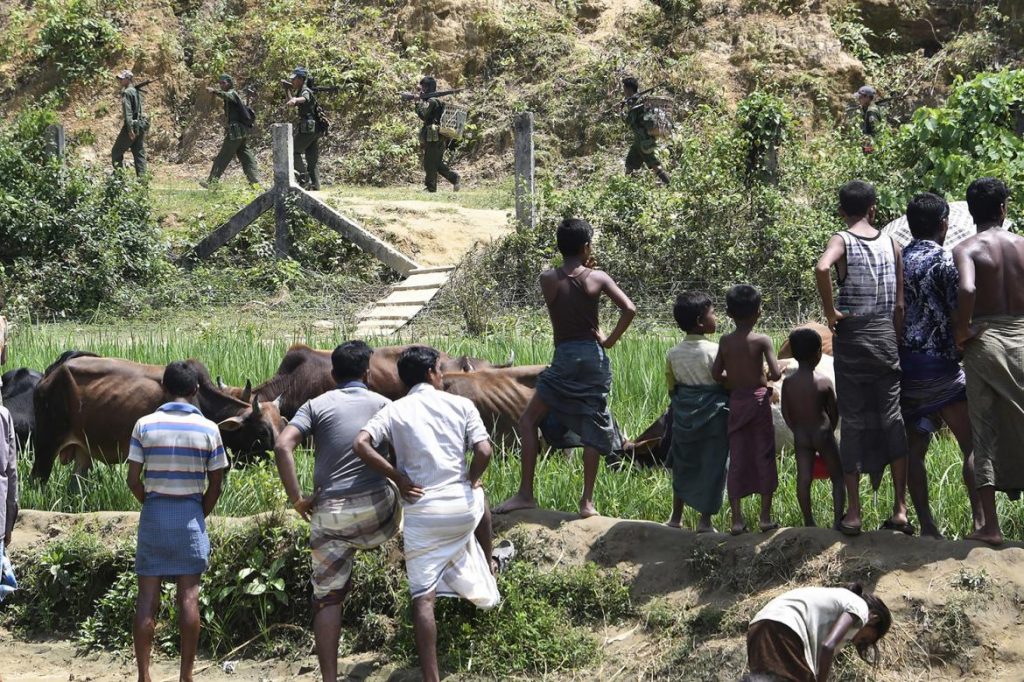Urgent diplomacy may be necessary to avert a breakdown in relations between Myanmar and Bangladesh amid the crisis over the exodus of Muslims from Rakhine State.
By SITHU AUNG MYINT | FRONTIER
THE CONFLICT that began after the Arakan Rohingya Salvation Army launched a series of coordinated attacks in northern Rakhine State on August 25 apparently lasted less than two weeks but its repercussions have been huge.
When State Counsellor Daw Aung San Suu Kyi addressed the situation on September 19 in a speech in English directed at the international community, she said the Tatmadaw clearance operation launched in response to the attacks had ended on September 5. If so, the attacks by the Arakan Rohingya Salvation Army and the Tatmadaw’s response lasted 12 days. The violence resulted in the torching of many villages and hundreds of houses. About 26,000 – a mix of Rakhine, Hindus and small minorities – were internally displaced by the violence and around 430,000 Muslims who self-identify as Rohingya fled to Bangladesh.
The displacement of such large numbers of people has created an international refugee crisis. United States Vice President Mr Mike Pence told the United Nations Security Council that the situation was “endangering the sovereignty and security of the entire region”. The US wanted the Security Council and the UN “to take strong and swift action to bring this crisis to an end,” Pence said.
Addressing the UN General Assembly on September 21, Bangladeshi Prime Minister Sheikh Hasina said the refugees from Myanmar “must be able to return to their homeland in safety, security and dignity”. The situation in Rakhine has become an international problem in which Bangladesh is inextricably involved. How will this affect relations between Myanmar and Bangladesh? What might happen next along the “Western Gate”, as the border with Bangladesh is called in Myanmar?
Support more independent journalism like this. Sign up to be a Frontier member.
Myanmar and Bangladesh have generally had good neighbourly relations. A long-running maritime boundary dispute was settled in 2012 when the two countries accepted a decision by the International Tribunal for the Law of the Sea. Although Bangladesh has often complained over the influx of Muslim refugees from Myanmar – which as a result of the latest exodus is now about 800,000 people – the issue has never resulted in military conflict between the two countries.
In recent years, when the Myanmar navy intercepted vessels in the Bay of Bengal carrying boat people from Myanmar and Bangladesh, each country accepted the return of their citizens, and a potential problem was averted. The two countries have held “flag meetings” on the border and there has also been regular dialogue between their security officials.
When Sheikh Hasina attended a meeting of the BIMSTEC regional grouping in Nay Pyi Taw in March 2014, she held talks on the sidelines of the event with Daw Aung San Suu Kyi when the National League for Democracy was the opposition party. Since the NLD government took office, the two countries have met to promote bilateral ties, including trade.
Although there are armed groups along Myanmar’s borders with India, China and Thailand, there is no rebel group of any significance on the border with Bangladesh. The Arakan Army, an ethnic Rakhine ally of the Kachin Independence Army, fought a series of battles with the Tatmadaw in Rakhine in late 2015 and early 2016. The AA uses weapons smuggled across the country from Thailand; it does not receive arms from the Bangladesh side of the border.
After the attacks on October 9 last year, when ARSA fighters armed with swords, spears, catapults and home-made guns launched deadly raids on border guard posts in northern Rakhine, Bangladesh said it would never allow militants to use its territory as a base for attacks on Myanmar. Bangladesh has kept this promise.
The coordinated attacks by ARSA on 30 police stations and a military camp in northern Rakhine on August 25 involved extremists armed with spears, swords, crude bombs, home-made guns and weapons stolen from police stations. The Tatmadaw was able to crush the poorly armed ARSA forces in a short period of time.
The latest violence has left almost 430,000 Muslims stranded on the Bangladesh side of the border, many of whom are young, impoverished and illiterate. There is concern that they might be targeted for recruitment by extremist groups – and indications this might already be happening. The Myanmar government and the Tatmadaw must move carefully to ensure that the refugee crisis does not create the conditions that would support the emergence of an armed insurgency along the western border, as there are along the borders with China and Thailand. The refugee crisis must be carefully and systematically handled.
Measures must be taken in Rakhine to ensure security for all residents, to enable both communities to coexist peacefully and to accelerate the pace of economic development in what is one of the country’s least developed areas. A concerted effort is also needed to promote and maintain good neighbourly relations with Bangladesh. If we can do this immediately, we will be able to avoid the risk of a catastrophe on the border.







